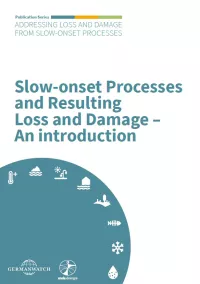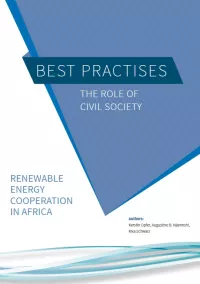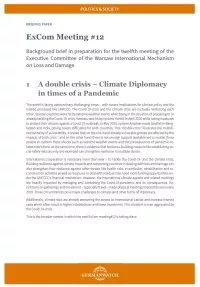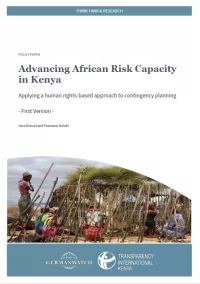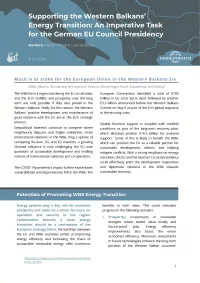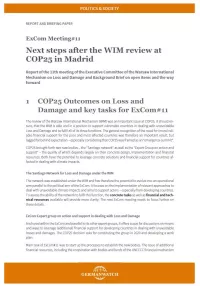Aktuelles zum Thema
In addition to amplifying extreme weather events, climate change also causes or intensifies slow-onset processes such as sea-level rise, desertification, biodiversity loss or permafrost thaw. Both types of climate change impacts cause loss and damage, impede the enjoyment of human rights and can be drivers for human mobility. In contrast to extreme weather events, dealing with loss and damage caused by slow-onset processes in the context of climate change is still neglected, both at the national and international level.
Bonn/Berlin (25th Jan. 2021). Vulnerable people in developing countries suffer most from extreme weather events like storms, floods and heat waves, while the impacts of climate change are visible around the globe. Being the deadliest and costliest tropical cyclone in the South-West Indian Ocean, tropical Cyclone Idai was labelled “one of the worst weather-related catastrophes in the history of Africa” by UN Secretary General Antonio Guterres.
African countries have considerable and largely untapped potential in renewable energies. They have the potential to leapfrog to smart, participatory, distributed energy systems of the future without locking themselves into stranded fossil fuel assets and overly centralised energy systems. Thus, African countries can show the way to the future through bold plans and on-the-ground implementation.
The Briefing Paper on the 12th meeting of the Executive Committee (ExCom) of the Warsaw International Mechanism on Loss and Damage from 12-16th October 2020 is mainly directed at persons interested in the discussions on Loss and Damage within the UNFCCC process.
The meeting will take place in the middle of the Covid-19-crisis that comes across with severe challenges for vulnerable groups but also in regards of keeping up climate diplomacy.
African Risk Capacity (ARC) is a specialised agency that follows the vision of: “protect the livelihoods of vulnerable people in Africa against the impact of natural disasters through home-grown, innovative, cost-effective, timely and sustainable solutions.” As a regional, African-owned, and African Union (AU)-led insurance pool, ARC is an essential component of a more comprehensive approach to anticipatory climate risk management. It covers the issues of financial risk management through risk pooling and transfer. Contingency planning is a central part of ARC insurance, and a precondition to purchasing a policy. The specific advantage of an ex-ante mechanism such as this is its fast availability of support; thus, it help avert suffering.
Long-term stability and prosperity in the Western Balkans is closely interlinked with the fate of the EU. A positive development in the region and the maintenance of good relations are in the EU’s strategic interest. Geopolitical interests continue to compete in the Western Balkans: China is increasingly rivalling ideas of international solidarity and co-operation offered by the EU. This has become most apparent during the outbreak of the COVID-19 pandemic and the economic crisis that followed. The new momentum of recently extended financial support should be the starting point for a more serious cooperation with the Western Balkans on the energy transition. The German EU Presidency in the second half of this year should focus on making energy transition partnerships a reality. This is an opportunity that the EU should not miss.
The 11th meeting of the Executive Committee of the Warsaw Inernational Mechanism took place at the beginning of the corona crisis and therefore faced severe organisational challenges. It was held virtually, which posed challenges like internet connectivity problems and lack of possibilities for inclusive participation. Topics of this meeting were for example to discuss inter alia COP25 outcomes like the establishment of the “Santiago network on loss and damage” and the "Expert Group on action and support".
The report covers the key expectations for the meeting, the outcomes, the special corona context as well as recommendations on the way forward and necessary next steps.
Severe heat waves, drought and flooding: Extreme weather events are massive challenges especially for poor and vulnerable countries - but also high-income countries are threatened more and more by climate risks. The Global Climate Risk Index, published today by the environmental think tank Germanwatch, shows that in 2018 industrialized countries like Japan and Germany were hit hardest by heat waves and severe drought. The Philippines were hit by the most powerful typhoon recorded worldwide in 2018.

